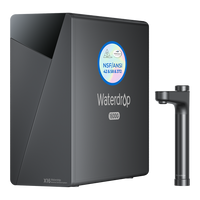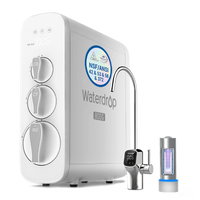We acquire water every day, and its importance is evident. As life progresses, much attention is paid to water quality.
Most people compare bottled water brands in supermarkets to choose the ones advertised as "beneficial." I've published a blog that tells the dangers of bottled water:
Why You Need to Stop Drinking Bottled Water?
It is imperative to ask how beneficial is defined. It doesn't go beyond notice that most water advertised as beneficial on the market is alkaline water. Well, how beneficial is alkaline water, or is it just a marketing or advertising bait?
Understanding Water pH
With the recent attention people pay to health and food quality,
pH is essential in drinking water quality. pH measures the quantity of electrically charged particles in a substance. In addition, pH indicates the acidity or alkalinity (basicity), and the scale ranges between 0 and 14.
The pH of pure drinking water is 7, which is a neutral pH. Usually, acidic water has a pH lower than 7, while alkaline water has a pH higher than 8.
| Water Type |
pH |
| Tap water |
It varies, but it is typically about 7.5 |
| Distilled reverse osmosis water |
5 to 7 |
| Common bottled water |
6.5 to 7.5 |
| Bottled water labeled as alkaline |
8 to 9 |
| Ocean water |
About 8 |
| Acid rain |
5 to 5.5 |
The EPA doesn't explicitly regulate the drinking water pH level because it is considered aesthetic water quality. However, the EPA recommends that the pH of municipal water supply should be between 6.5 and 8.5.
Benefits And Health Risks of Alkaline Water
Benefits
Alkaline water is quite controversial, and there are various health claims concerning the water. Some people claim that alkaline water restores pH balance in the body, increases energy levels, and reduces signs of aging. Nevertheless, no research fully backs such claims.
Some small studies show that alkaline ionized water benefits people with high blood pressure, diabetes, and high cholesterol. Nevertheless, there is a need for more research.
According to the Journal of the International Society of Sports Nutrition, consuming alkaline water showed a significant difference in blood viscosity compared to plain water. Blood viscosity is the measure of hydration levels; low blood viscosity indicates high hydration levels. Therefore,
alkaline water decreased viscosity in people consuming alkaline water compared to people drinking regular water.
Apart from its quick hydration, alkaline water does not treat cancer, nor does it slow down aging.
Health Risks
Although most companies advertise the benefits of alkaline water, they hardly clarify its side effects to customers. In addition, overall excess alkalinity in the body causes
gastrointestinal issues and skin irritations. It can also lead to health conditions like alkalosis, which results from the bloodstream losing too much acidity. Symptoms of
alkalosis include confusion, hand tremors, and nausea. Furthermore, alkaline water is not suitable for people with kidney or gastrointestinal diseases.
Benefits And Health Risks of Acidic Water
Acidic water has potent microbial effects, making it effective
against atopic dermatitis; this is a chronic inflammatory skin condition that causes red, itchy rashes. Acidic water can maintain the most suitable body pH to keep the skin hydrated and protect against inflammatory skin conditions.
Although not confirmed by research, Acidic water provides numerous benefits for hair health, including preventing hair loss and reducing dandruff.
Also, because of its microbial effects, acidic water is recommended for cleaning fruits and vegetables.
Summarily, acidic water has antimicrobial effects, making it highly beneficial. However, little evidence backs up the connection between acidic water and its earlier discussed benefits.
Health Risks
Although the benefits of acidic water are not clear, the health risks are pretty obvious. A significant concern with acidic water is the high amounts of heavy metals it contains. Heavy metals exposure is dangerous for human health; it can cause diarrhea, nausea, vomiting, and abdominal pain.
In addition, drinking acidic water can
affect the teeth and bones. The hard, outer surface of the teeth that offers protection is prone to damage from acidic substances. There have been claims that drinking acidic water can prevent calcium absorption, leading to bone loss with time.
What Should Be The pH Of Drinking Water?
It is clear that neither alkaline nor acidic water is necessary. However, if your drinking water is outside the range of 6.5 to 8.5, it is time to take necessary actions. It is vital to ensure the cleanness and purity of your drinking water. Reach out blog to learn more reasons to drink purified water:
The Benefits of Purified Water. The level of contaminants in drinking water rather than the pH should determine its quality.
Waterdrop G2MNR reverse osmosis water filtration system can provide you with purified, safe, and healthy water. The RO system can reduce harmful chemical agents in water before drinking. Over the years, some of the substances found in tap water include Arsenic, Aluminum, Lead, Chlorine, Radium, Potassium, Nitrate, and Phosphorus. The post-mineral filter in the filtration system adopts 18 natural minerals in restoring minerals like calcium, magnesium, sodium, and potassium. Consuming this type of water has proven to prevent chronic diseases, slow down the aging process, and improve digestion and immunity in the long run.
Conclusively,
The pH of water determines its alkalinity or acidity. Nevertheless, the concentration of contaminants in drinking water is more representative of its quality than its pH. Therefore, it is best to get a
reverse osmosis system that provides you with quality and safe drinking water. This blog gives a complete guide on choosing reverse osmosis water filter:
Waterdrop Best Selling RO Systems Review.






































































